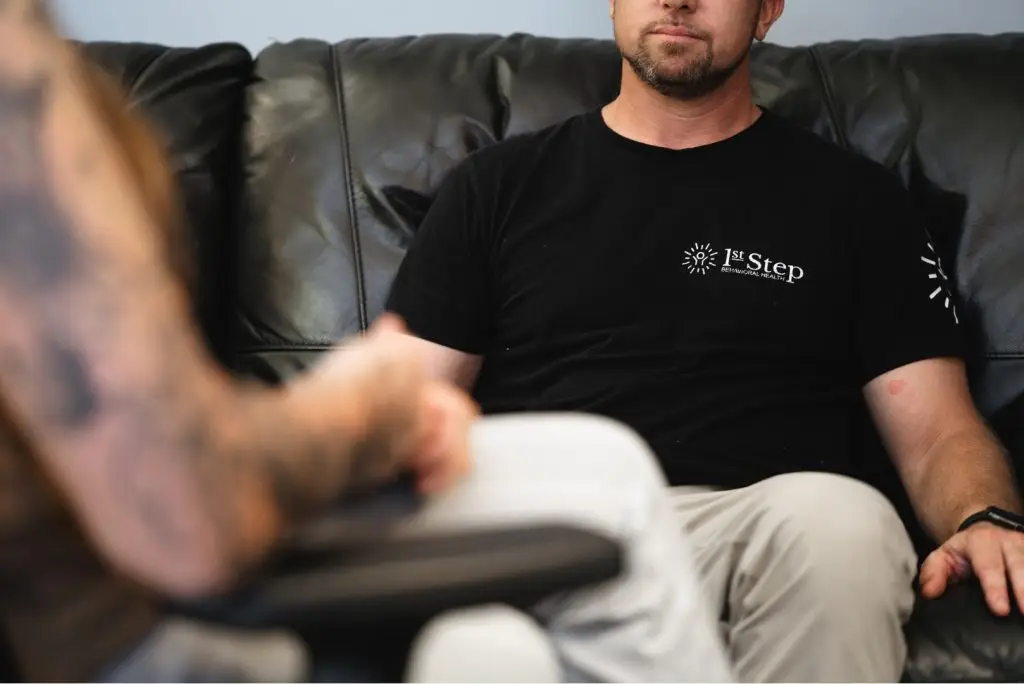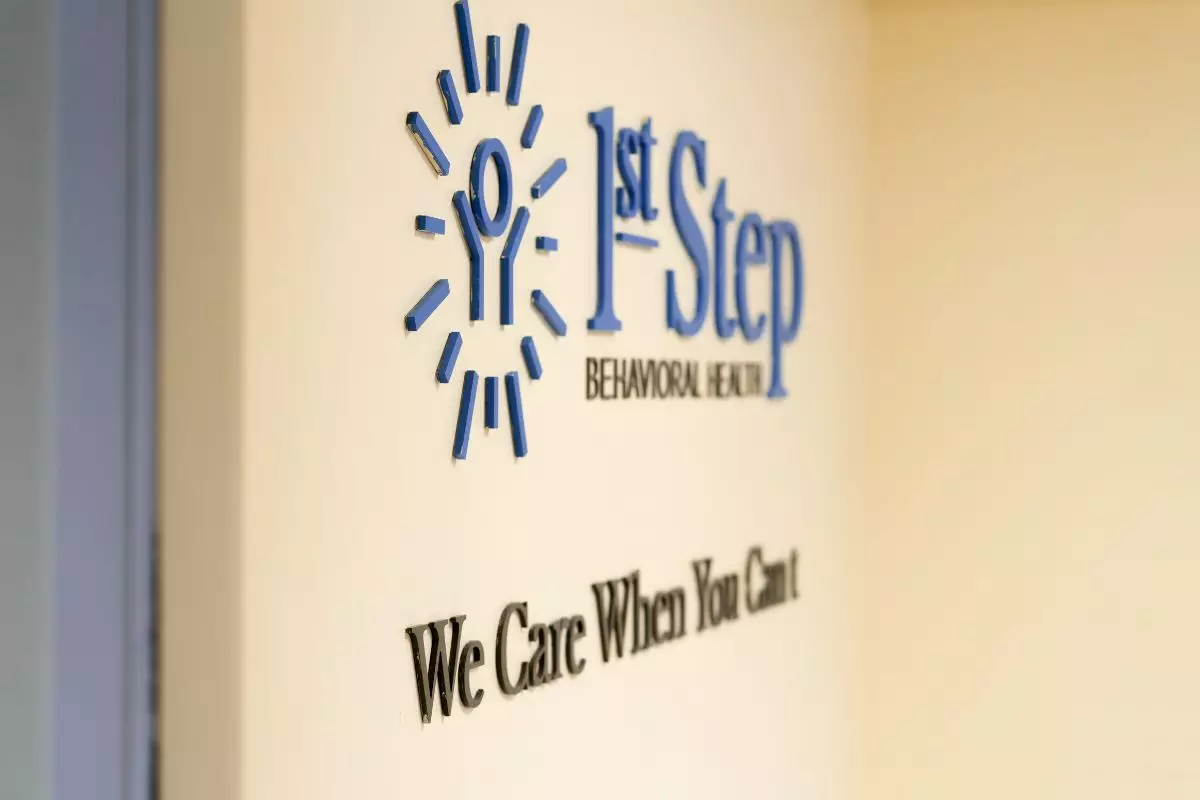Mental Health Treatment
At 1st Step, mental well-being is not something we take lightly. Our program is not just about treating addiction; it’s about treating the person as a whole. From pain, comes significant growth and learning, and we believe that we can help you see that. Call today to speak with an admissions coordinator to learn about your treatment options.

What is Mental Health?
Mental health refers to your emotional, psychological, and social well-being. It impacts how you think, feel, and act. Through childhood to adulthood years, your mental well-being is constantly being shaped.
Everyone experiences challenging and confusing times. You may find yourself feeling lost and frustrated with the emotions you feel. If these feelings are worked properly, then the problems are resolved in a healthy manner. Neglecting these emotions, however, can lead to a variety of long-term mental health issues.
The mental well-being of each person varies due to their life experiences. Aside from the circumstances of each individual, genetics also play a role, as having parents who have mental health struggles can increase the risk of having your own.
Whether your mental health condition stems from substance abuse, genetics, or childhood trauma, our mental health treatment center in Pompano Beach, FL will help you to move forward.
What are Mental Health Conditions?
Mental health conditions, also known as mental illnesses, are a wide range of disorders that affect your mood, thinking, and behavior that significantly affect one’s quality of life. Mental health conditions can vary in severity, duration, and the specific symptoms they present. Some of the most common mental illnesses are depression, anxiety, bipolar disorder, eating disorders, personality disorders, and substance use disorders.
Mental health conditions are common, and they can affect anyone regardless of age, gender, race, or background. Fortunately, mental health conditions are treatable, and individuals experiencing symptoms can benefit from a variety of interventions, including therapy, medication, lifestyle changes, and support from mental health professionals and loved ones. Early detection and intervention are often key to managing mental health conditions effectively.
Below we will outline the different mental health conditions and how they are treated. If at any point you suspect you have a mental illness and need treatment, please don’t hesitate to reach out to our compassionate team at 1st Step.
Personality Disorders
Personality is the way of thinking, feeling, and behaving that differentiates people from one another. An individual’s personality is influenced by their experiences, environment (surroundings, life situations), and genetic traits. A person’s personality typically stays the same over time. However, a personality disorder is a way of thinking, feeling, and behaving that causes distress and interrupts daily functioning in significant ways.
There are 10 specific types of personality disorders. Psychiatrists classify these as:
- Schizoid personality disorder – Schizoid personality disorder is characterized by a pervasive pattern of social detachment and limited emotional expression.
- Schizotypal personality disorder – Schizotypal personality disorder involves eccentric behavior, unusual beliefs, and difficulty forming close relationships.
- Antisocial personality disorder (ASPD) – Antisocial personality disorder (ASPD) is marked by a disregard for the rights of others, impulsivity, and a lack of empathy or remorse.
- Borderline personality disorder (BPD) – Borderline personality disorder (BPD) is defined by unstable relationships, self-image, and mood, often leading to intense and unstable emotions.
- Histrionic personality disorder – Histrionic personality disorder is characterized by excessive attention-seeking behavior, emotional volatility, and a desire to be the center of attention.
- Narcissistic personality disorder – Narcissistic personality disorder is marked by a grandiose sense of self-importance, a need for excessive admiration, and a lack of empathy for others.
- Avoidant (or anxious) personality disorder – Avoidant (or anxious) personality disorder involves extreme social anxiety, a fear of rejection, and a reluctance to engage in interpersonal relationships.
- Dependent personality disorder – Dependent personality disorder is characterized by an excessive reliance on others for decision-making and an intense fear of separation or abandonment.
- Obsessive-compulsive personality disorder (OCDP) – Obsessive-compulsive personality disorder (OCPD) involves an obsession with order, perfectionism, and control, often at the expense of flexibility and spontaneity.
Treatment & Therapies for Personality Disorders
Therapy is a general term for the application of techniques used to improve a person’s mental or physical well-being. Psychotherapy, also known as talk therapy, is the main method used in treating personality disorders.
Throwing medication at a problem without getting to the root is essentially pointless. Instead, we believe in treating our patients as a whole – physically, mentally, and emotionally. Our trained professionals help patients by encouraging them to talk about their condition, feelings, thoughts, mood, and behavior.
Types of psychotherapy for personality disorders include:
- Cognitive-behavioral therapy (CBT)
- Dialectical behavior therapy (DBT)
- Interpersonal therapy (IPT)
- Family-focused therapy

Anxiety Disorders
Experiencing anxiety is normal. Everyone gets feelings of nervousness from time to time, or when triggered by a specific situation. However, people with anxiety disorders consistently have intense, excessive, and persistent worry and fear about everyday situations. They may also experience episodes of sudden feelings of intense fear and panic attacks.
Persistent feelings of anxiety and terror can get in the way of one’s ability to function normally. They can be extremely difficult to control and make people feel out of touch with reality. For example, people may avoid places or situations that trigger these unpleasant emotions. Symptoms of anxiety often start during adolescence and continue into adulthood.
Anxiety disorders include:
- Generalized anxiety disorder – Generalized anxiety disorder is characterized by excessive and uncontrollable worry about various aspects of life, often accompanied by physical symptoms such as restlessness and muscle tension.
- Social anxiety disorder (social phobia) – Social anxiety disorder (social phobia) involves an intense fear of social situations and scrutiny, often leading to avoidance of social interactions.
- Specific phobias – Specific phobias are intense and irrational fears of specific objects or situations, such as heights, spiders, or flying, causing significant distress and avoidance behaviors.
- Separation anxiety disorder – Separation anxiety disorder is marked by excessive anxiety and fear when separated from attachment figures, typically seen in children but can persist into adulthood in some cases.
It is possible to experience more than one anxiety disorder. Sometimes anxiety results from a medical condition that needs medical or therapeutic attention.
Symptoms of Anxiety
Anxiety symptoms can vary from person to person, and no one situation will be the same. Each individual’s journey and obstacles will vary. However, the body typically reacts in a very specific way to anxiety.
When you experience anxiousness, your body goes on high alert, looking for possible danger and activating your fight or flight responses.
Common symptoms of anxiety typically include:
- Nervousness, restlessness, or feelings of tension
- Feelings of danger, panic, or dread
- Rapid heart rate
- Hyperventilation
- Weakness
- Difficulty concentrating
- Insomnia
- Obsessions about certain ideas, a sign of obsessive-compulsive disorder (OCD)
- Repetitive (often toxic) behavior
- Anxiety surrounding a particular life event or experience that has occurred in the past, especially indicative of post-traumatic stress disorder (PTSD)


Panic Attacks
A panic attack is a common side effect of anxiety. It is also referred to as an anxiety attack. It can be described as a sudden onset of fear or distress that peaks in minutes.
It generally involves experiencing at least four of the following symptoms:
- Palpitations
- Sweating
- Trembling
- Shortness of breath
- Tightness in the chest
- Feeling faint
- Feeling hot or cold
- Numbness or tingling sensations (paresthesia)
- Feeling detached from oneself or reality, known as depersonalization and derealization
- Fear of “going crazy” or losing control
- Fear of death
If you or a loved one is experiencing these symptoms, don’t hesitate to give us a call today. Your mental well-being is important and must be taken care of.
Treatment and Therapies for Anxiety Disorders
There is no shortage of resources when it comes to treatment for anxiety. At 1st Step, we offer a variety of different therapies and medical care that can help individuals manage their anxiety effectively without turning to drugs or alcohol.
Cognitive-behavioral therapy (CBT)
Cognitive-behavioral therapy (CBT) is a well-known method in psychotherapy. Through CBT, individuals can learn to recognize and change thought patterns and behaviors that lead to anxious feelings. This form of psychotherapy helps people understand how their thoughts and behaviors connect.
Occupational therapy
Occupational therapy generally focuses on identifying symptoms of anxiety through detailed assessment and providing therapy. The main role of an occupational therapist is to correct the behavior by providing different approaches and activities.
Acupuncture
Acupuncture is a traditional Chinese treatment for anxiety, depression, and other health conditions. During acupuncture, a practitioner sticks thin, sharp needles into the upper layers of skin, at points of the body that correspond with different organs. Acupuncture works by activating natural painkilling chemicals in the brain. This can, in turn, reduce anxiety.
Yoga
Yoga combines breathing techniques, meditation, and stretching through both moving and stationary postures. Yoga has many benefits. It can help you appreciate the present moment more, as well as deal with inconvenient pain.
Bipolar Disorder
Bipolar disorder is a mental illness that can be defined by extreme shifts in mood. Bipolar disorder is also referred to as bipolar disease or manic depression. People who suffer from bipolar disorder experience both manic and depressive episodes.
“Manic” describes an increasingly restless, energetic, talkative, reckless, powerful, euphoric period. Then, at some point, this euphoric state can spiral into something darker – irritation, confusion, anger, feeling trapped. “Depression” describes the opposite mood – sadness, crying, sense of worthlessness, loss of energy, loss of pleasure, as well as insomnia.
There are three types of bipolar disorder:
- Bipolar I Disorder – Characterized by manic episodes lasting at least one week, often accompanied by depressive episodes, and can include psychotic features.
- Bipolar II Disorder – Involves recurrent depressive and hypomanic episodes (less severe than full-blown mania) but no full manic episodes.
- Cyclothymic Disorder – Marked by numerous periods of hypomanic symptoms and depressive symptoms over at least t
Bipolar Symptoms
The symptoms vary based on the episode. However, they can generally be categorized by manic and depressive episodes. Mania and hypomania are also two distinct types of episodes, but they have the same symptoms.
Manic and hypomanic episodes include three or more of the following symptoms:
- Abnormally jumpy
- Increased activity, energy, or agitation
- Euphoric feelings
- Decreased need for sleep
- Unusual chattiness
- Racing thoughts
- Distractibility
- Poor decision-making
A depressive episode includes symptoms that are severe enough to cause noticeable difficulty in day-to-day activities, such as work, school, social activities, or relationships.
A depressive episode includes five or more of the following symptoms:
- Depressed mood, such as hopelessness or emptiness
- Irritability
- Loss of interest or feeling no pleasure in most activities
- Significant weight loss or gain
- Insomnia or sleeping too much
- Slowed behavior or restlessness
- Fatigue
- Self-loathing
- Difficulty concentrating
- Thinking about, planning, or attempting suicide
Bipolar Disorder Treatment in Florida
At 1st Step, treatment for bipolar disorder is carefully tailored to each patient. We make sure to look over the patient’s past medical history, as well as their current state. Treatment for bipolar disorder can include a variety of different methods.
Depending on your needs, treatment may include:
- Medications to balance mood changes. Mood stabilizers and antidepressants are often used to help manage bipolar disorder symptoms.
- Day treatment programs offer a structured approach to treatment including daily appointments with a therapist
- If you have problems with alcohol or drugs, you’ll also need substance abuse treatment
- Hospitalization or inpatient treatment may be necessary depending on the severity of the disorder.

Depression
Depression (major depressive disorder) is a common and serious mental health concern that negatively impacts how you feel, the way you think, and how you act. Sadness is a normal emotion we all experience. However, depression is a consistent state in which a person feels unfulfilled, hopeless, and sad.
Depression causes feelings of unhappiness and/or a loss of interest in activities once enjoyed. It can lead to a variety of emotional and physical problems and can decrease a person’s ability to function at work and home.

Symptoms of Depression
Recognizing the symptoms of depression is crucial. Understanding what you’re going through allows you to know when to seek help. Symptoms of depression generally include:
- Difficulty focusing
- Fatigue
- Feelings of shame
- Pessimism and hopelessness
- Insomnia, early-morning wakefulness, or sleeping too much
- Irritability
- Restlessness
- Loss of interest in things once pleasurable, such as sex
- Overeating, or appetite loss
- Persistent sad, anxious, or “empty” feelings
- Suicidal thoughts or attempts
Depression Treatment in Florida
Depression is a treatable mental illness. However, as stated by the World Health Organization, less than 50 percent of people diagnosed with depression worldwide receive treatment.
There are many ways to go about treating depression. There are lifestyle changes that can significantly improve one’s depression. At 1st Step, we offer holistic care, therapy, and much more when it comes to treating depression.
Some types of therapy teach you practical techniques on how to reframe negative thinking and change toxic behavior habits. Therapy can also help you work through the root of your depression, helping you understand why you feel a certain way.
At 1st Step, our depression treatment program will help you:
- Build and sustain healthy relationships. Through different forms of therapy, we’ll arm you with the right tools to build healthy relationships in your life.
- Set healthy boundaries. It’s important to know when to say no. We often clutter our lives with unnecessary things, people, and situations. Breaking out of this pattern and being intentional with your time is another powerful tool we’ll teach you. We believe in the power of talk therapy and consistently working towards a happier future through practiced techniques.
- Handle life’s problems. Talking with a trusted therapist will provide you with solid feedback on more positive ways to handle life’s unfavorable situations. It’s all about changing the way you react to situations. You can’t always control the situation, but you can control the response.
Treatment may also involve finding the right antidepressant medication for you.
Medication Management in Mental Health Treatment
Medication management therapy (MMT) is a treatment system used by doctors and pharmacists to ensure that patients are receiving optimal medical and psychiatric care. Especially when prescribing medication, patients must be monitored and taken care of accordingly.
Medication management may be advised for patients who:
- Developed an alcohol or opioid dependence
- Have severe cravings and/or withdrawal symptoms
- Have a co-occurring medical or mental health disorder
- Were abusing multiple drugs at once (poly-substance abuse)
Many individuals with mental health disorders also have co-occurring medical or other mental health conditions. Medication management takes these comorbidities into account, ensuring that the treatment plan addresses all aspects of the patient’s health.

Take the First Step Toward Recovery at our Florida Mental Health Treatment Center
If you’re struggling with mental illness, don’t shy away from getting help at 1st Step, a licensed mental health treatment center in Florida. Many people are in the same boat as you, but no matter what struggle you’re going through, the right treatment can help propel you forward.
You don’t have to experience pain forever – there is fulfillment and happiness on the other side of this challenge. Our mission is to help you live the life you deserve using the treatment you need. Call or text 1st Step Behavioral Health at (855) 425-4846 or contact us here for more information about our programs.
